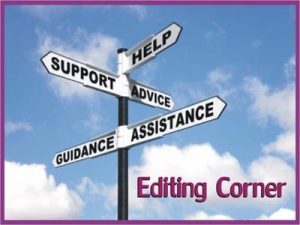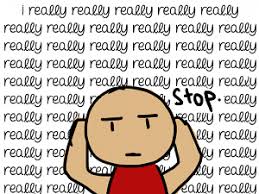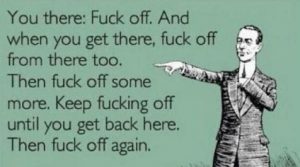This post is about how to avoid repetition in your writing, or to put it another way, how to avoid repetition in your writing (see what I did there?).
Writers sometimes use repeating elements intentionally because it’s a powerful tool for adding emphasis. Poets use repetition and anaphora to give rhythm and cadence to their writing. But what I know about poetry could be inscribed on the sex organ of a dwarf-ladybird, so I have no intention of trying to explain how repetition should be used to enhance your writing.
Here’s one of my favourite examples of intentional repetition, where the same phrase is used several times to emphasise the writer’s message.
This post is aimed at how to avoid the unintentional repetitions that find their way into our stories.
Repetition isn’t just about telling the reader the same information several times, overusing certain words or using the same word more than once in a sentence.
Avoiding repetition is about making your piece of work as diverse as possible, and you can do this by varying the word choice, the sentence structure and the paragraph length.
All writers have their own style and their own voice, and they also have their own repetitive quirks. It usually takes someone else to point them out to us – either our editor or readers offering a critique. Once you become aware of these quirks, you can use the ‘Find’ tool on Word and go through your manuscript to see if you need to remove or replace any of them.
This is referred to as a ‘Britney Edit’ (oops, I did it again).
The internet is full of help pages and tips on how to avoid repetition in your written work, and below are some of the ones I think are the most helpful.
- Read your work out loud.
Our eyes skip over our own words—especially when we’ve read them so many times. But by reading them out loud it gives a new perspective, and it makes it easier to hear you’ve used some words about twenty times in a chapter. Read slowly and listen to your words, then cut anything your hear too often.
- Avoid overused words
Unique words are fairly easy to avoid. Once you’ve used antidisestablishmentarianism, it’s easy to remember you’ve already enlightened your readers to your brilliant vocabulary. It’s more likely to be the common words that are the problem. Apparently, five of the most frequently overused words are: so, still, though, very and well. Check your own stories and see how often you use these words, and then decide if you actually need them or not.
I was first alerted to my overuse of ‘realise’ by a guy in the US. Each time he saw my UK spelling, underlined in red, it highlighted the fact I had about ten instances of the word in each chapter.
- Separate narrative from dialogue
If you intentionally have a character using a particular word or phrase in his dialogue to make him more recognisable, try to make sure you don’t overuse that word or phrase anywhere else in the story.
- Buy yourself a thesaurus
To avoid repeating words, a quick and easy solution (if you’re using Microsoft Word) is to right-click on the word and choose ‘synonyms’ from the dropdown menu. This will give you a few common alternatives. This is also useful when eliminating duplicated words within the same sentence. However, Microsoft don’t seem to have considered authors of erotica when they filled in the synonyms. For most of the common terms we use for body parts, they suggest we consult a thesaurus, but as alternatives for ‘cock’ they suggest raise, tilt, lift, incline or angle.
- Rotate your characters’ names for pronouns.
This is another area where reading out loud can help you find a good balance. Although you want the reader to be sure who is speaking, you don’t want to ram it down their throats (unless that’s part of the scene you’re writing).
Pronouns like he and she tend to be ‘silent’ words and hardly noticed.
But if you’ve ever written a sex scene involving more than one character of the same gender (for example, MM, FF, MFM or MFF), you’ll be aware how pronouns are much less user-friendly in those circumstances.
- It’s not just the words; think about sentence and paragraph variation
Try and introduce variety into the length of the sentences, with some short and some longer (though be conscious that overly-long and complicated sentences make it difficult for readers, especially if they’re only using one hand).
Vary the structure of your sentences, and make sure you don’t start each sentence in the same way. If every sentence begins with the same words or has the same structure, then the pace of your story will be the same and it will make it feel repetitive. It’s the same thing with paragraphs. These can be anything from a single sentence to five or more sentences. They’re there to give readers a break—but giving them breaks at exactly the same time over and again gets repetitive.
After you’ve finished your piece (be it a chapter or a full manuscript), quickly skim the first few words of each paragraph to make sure you’ve not repeated paragraph intros. It’s very easy to do without noticing it.
- Sometimes you can use the same words
As mentioned earlier about pronouns being ‘silent’, another word that seems to slip by readers without them noticing is ‘said’. This is a word you can use many times, as opposed to characters ‘hissing’ or ‘snarling’ too often, which readers would notice.
I try to minimise speech tags when I write, but that’s a personal thing. I see lots of writers who use he said/she said on almost every line, and apparently that doesn’t really count as repetition. But I do think that making your character’s voice identifiable helps minimise the use of speech tags.
In conclusion, avoiding unwanted repetition is about making sure your stories are diverse at every level. This includes your words, your sentences and your paragraphs.
Once you’re made aware of your own particular repetitive quirks and the mistakes you commonly make, they become easy to avoid.








Apologies for my forgetting to put in the Editing Corner signpost. The only way I was able to rectify it was to re-post with the photograph included, and then delete the post without it.
So for a short time, there were two copies of a post on avoiding repetition 🙂
I’m afraid I lost Darnell’s comment, but I did copy it and will re-post it shortly
Very good insight for writers of all levels. By any chance, is there a thesaurus just for erotica writers? Might be a moot point, but I just wondered.
Hi Darnell
Thanks for reading and the nice words.
I’m not sure if there’s a thesaurus specifically for erotica authors, but if you get stuck for alternative words for body parts you can use http://onlineslangdictionary.com and search genitals, or https://www.powerthesaurus.org has over a hundred synonyms for genitalia.
One of my favourite ‘reference’ books is ‘Roger’s Profanisaurus’ [https://www.amazon.co.uk/Viz-40th-Anniversary-Profanisaurus-Piss/dp/1781066779], which is guaranteed to make you laugh.
Delores
Hi Del, I knew Word has a thesaurus, and yet I always find myself Googling words instead. What’s wrong with me?
Spiffing post. Also ripping, topping, top-hole, wizard, and capital.
Hi Belinda
I’m sure your Google searches will bring you a wider variety of alternatives to choose from.
Thanks for the multiple ‘top-notch’ nice words 🙂
Hi Del,
Thanks for sharing your tips.
One thing I’ve found is that using a word once will predispose me to use it again within the next few paragraphs, even if it’s not one of my pet repeaters. I think there’s some sort of brain phenomenon where the neural activation around the word rises and it’s more likely to be accessible than competing words.
As for erotic thesauri, I found a couple of interesting links::
https://laurelclarke.com/2014/08/18/sexy-thesaurus-romance-erotica-words/
https://quillandquire.com/review/the-bald-headed-hermit-the-artichoke-an-erotic-thesaurus/